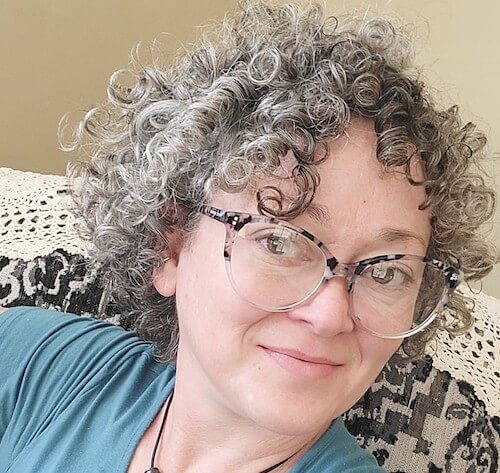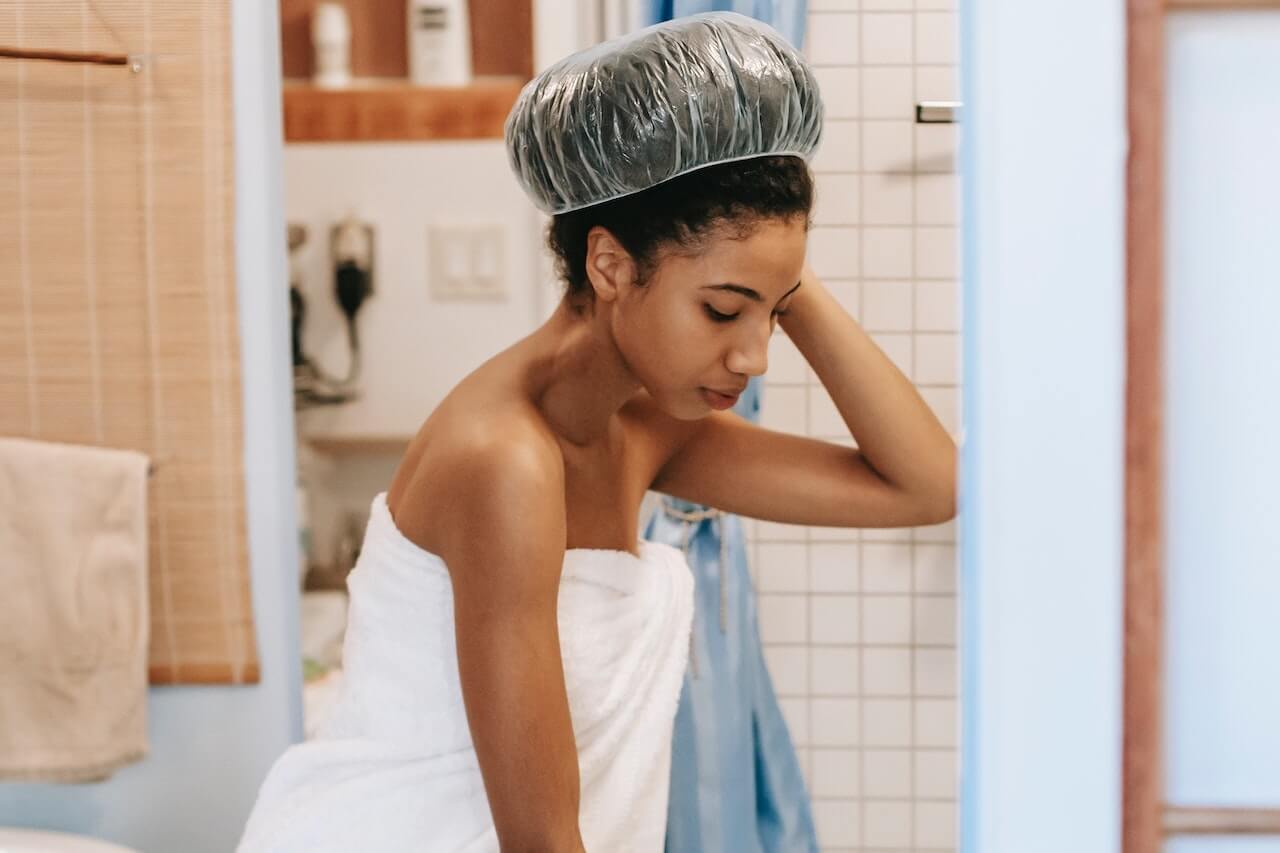Beginning any weight loss journey is difficult enough, but when you see more hair than normal clinging to your clothing, tangling in your brush and coming out when you shampoo, it can be alarming.
The good news is that sudden hair loss resulting from weight loss doesn't mean it will be ongoing or permanent. To help you sort it all out, read on to discover why some people experience hair loss when losing weight and how to prevent it, including what products you can use to encourage fuller looking hair.
#include-related-slider#
How Does Weight Loss Lead to Hair Loss?
Going on the latest crash diet you saw on Tik Tok may seem like a good idea at the time — until you see an alarming amount of hair coming out in the shower. Unfortunately, fad diets, crash diets or restrictive dieting are known to wreak havoc on hair.
Hair loss resulting from rapid or sudden weight loss is called telogen effluvium. TE typically occurs around two to five months after you experience a triggering cause, such as restrictive dieting or weight loss surgery, and is characterized by moderate amounts of hair coming out from all over the scalp.
Crash or restrictive diets are often based on drastically restricting calories, which, unfortunately, might also deprive your body of important vitamins and nutrients, leading to nutrient deficiencies that can negatively affect hair growth cycles. For example, some weight-loss diets with severe calorie restrictions can result in an iron deficiency, which can be related to hair loss. Additionally, restrictive diets can also result in a zinc deficiency, which can be related to brittle hair and hair loss. Lack of protein, selenium and essential fatty acids also have been linked to hair loss.
In addition to those already mentioned, some of the other important nutrients for your scalp and hair include the following:
- Vitamins B-5, 6,9 and 12
- Vitamin A
- Vitamin C
- Vitamin D-3
- Vitamin E
- Biotin
And while you should strive to incorporate foods in your diet that contain the above vitamins and minerals, biotin supplements are great for filling the gaps and promoting fuller-looking, radiant hair.
GRO Biotin Gummies contain biotin and zinc, plus all of the beneficial vitamins and minerals listed above. And incorporating this supplement into your daily routine is easy! All you have to do is take one delicious, strawberry-flavored gummy per day to support the health of your scalp and hair.
How to Prevent Hair Loss When Losing Weight
Thankfully, there are a few things you can do to prevent hair loss when losing weight.
It helps to understand that healthy hair depends on several things: eating a well-balanced diet to get enough calories and nutrients, increasing blood supply to the scalp to stimulate new hair growth, managing physical and emotional stress, and seeing your doctor about any underlying medical conditions. Additionally, you can use hair loss supplements and hair care products that work to promote visibly thicker, fuller looking hair while you are shedding those pounds. Here's more about each prevention strategy.
Use the Right Hair Care Products
If you have plans to lose weight, then this is the time to amp up your hair care with products that are toxin-free and are clinically proven to promote thicker, fuller looking hair. Here are a few products to consider if you want to prevent hair loss when losing weight.
- VEGAMOUR GRO Revitalizing Shampoo and Conditioner Kit: Feed your hair on wash days with this power duo that delivers microencapsulated vegan b-SILK™ protein to promote visibly thicker, fuller looking hair.
- VEGAMOUR GRO Hair Serum: Reduce signs of shedding by up to 85%* and increases the appearance of hair density by up to 56%*.
*Based on a 120-day independent, third-party clinical study with 40 participants using GRO Hair Serum once daily.
Eat a Proper Diet
As mentioned earlier, getting the right amount of nutrition is so important to your health and your hair when trying to lose weight. VEGAMOUR spoke with Becky Kerkenbush, president of the Wisconsin Academy of Nutrition and Dietetics, about the connection between rapid weight loss and the unwanted hair loss that can accompany it. She gave us some great advice on what you can do to turn things around.
"When intentionally losing weight, people sometimes reduce calorie and protein intake to the point that hair loss may occur," said Kerkenbush. "Nutrients that can help hair health and growth include protein, biotin, zinc, Vitamin C, Vitamin A, Vitamin E, iron and essential fatty acids."
Kerkenbush recommends nutrient-rich foods to help supply the vitamins, amino acids, and other nutrients your hair needs:
- Spinach
- Sweet potatoes
- Avocados
- Walnuts
- Almonds
- Flax seeds
- Chia seeds
- Berries
Kerkenbush also recommends eating 20-30 grams of protein per meal, paired with a food that is high in Vitamin C with an item high in iron for better absorption. "For example, include high Vitamin C vegetables (peppers, cauliflower, broccoli) in a spinach salad," she said. She also said not to shy away from fats, as the human body needs healthy sources of fat such as avocado, nut butters and olive oil to effectively absorb fat.
Rich sources of protein
- Beans
- Nuts and seeds
- Soy products
- Nut butters
- Tempeh
- Quinoa
Iron-rich proteins
- Spinach
- Legumes
- Green peas
- Chia seeds
Pace Your Weight Loss
Avoid crash and restrictive diets and aim to lose a healthy amount of weight at a slow but steady pace, which is about 1-2 pounds per week, according to the Centers for Disease Control.
Follow a Healthy Lifestyle
There's no doubt that a healthy you begins with a healthy lifestyle that goes beyond what you put on your plate. It also involves managing physical, mental and emotional stress, getting plenty of exercise and seeing your doctor regularly.
Also, if you experience hair loss, you will likely feel stressed about it, which can make the problem worse. Discuss these concerns with your medical doctor, and consider taking a little downtime to destress.
#include-related-slider#
Weight Loss Doesn't Have to Hurt Your Hair
Whether you are trying to lose weight or experiencing weight loss for some medical reason, try to stay focused on keeping it simple. Eat a healthy diet that provides adequate calories and nutrition, get enough exercise and use hair products that will benefit your hair's health. Also, take some time to pamper yourself and reduce stress. All of these things can help you (and your hair) get back on track to looking and feeling great!
More From VEGAMOUR
- What Causes Sudden Hair Loss?
- Mature vs. Receding Hairline — What's the Difference?
- 3 Surprising Reasons Hair Falls Out
Photo credit: Yan Krukov/Pexels
Back



















